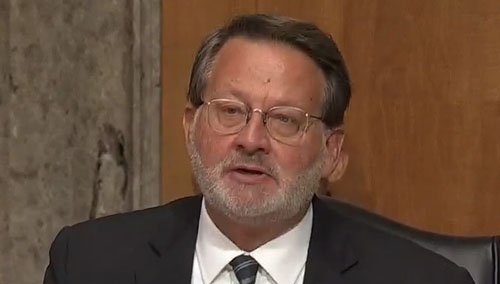by WorldTribune Staff, September 10, 2019
Two days before the 18th anniversary of the Islamist terrorist attacks of September 11, 2001, the Senate Homeland Security Committee held a hearing at the National 9/11 Memorial & Museum in New York City.
Panelists testifying during the hearing at the site where Islamist terrorists killed nearly 3,000 people focused their remarks on climate change as the most pressing threat to the U.S. homeland.

“The only references to ideological dimensions of Islamic terrorism were made by former Secretary of Homeland Security Michael Chertoff, who referred to ‘jihadi terrorists’ in three instances,” Breitbart News noted in a Sept. 9 report.
Terror attacks carried out by Islamic jihadists in the U.S. after 9/11 — including attacks in Fort Hood, Orlando and San Bernardino — were also ignored.
In his opening remarks at the hearing, Michigan Democratic Sen. Gary Peters called on the Department of Homeland Security (DHS) to make stopping climate change a priority and appeared to link the 9/11 attacks to climate change.
Peters said: “Climate change poses and existential threat not only to the United States but our entire planet. The Department of Homeland Security is our first line of defense against these and other challenges. As these threats to our homeland change, so must the efforts to protect our national security. With nearly two decades of lessons learned, the time has come for a clear-eyed assessment of what has worked and what needs to be improved. As we reflect on what the department has accomplished to date, we must consider whether the size and capacity of DHS can keep pace with the constantly evolving threats. In order to build a more sustainable department and defend ourselves from global threats, we must look to the future. It is not enough to understand the effect of the moment. We must also make sure DHS is prepared to anticipate those threats arising in our future. This is a difficult conversation, but one we must have to ensure we never again face a catastrophic event like September 11.”
Former DHS head Janet Napolitano also framed “climate change” and “global warming” as national security threats which should be prioritized by DHS. Napolitano tied the U.S. immigration crises to climate change.
“It is also time for Congress and DHS to recognize climate change as a generational threat to the homeland that must be addressed in a meaningful way,” Napolitano said. “The uptick is extreme weather events on land and offshore clearly impact the missions of FEMA and the U.S. Coast Guard, from rescue and reconnaissance to disaster preparation, response, and recovery, our changing climate requires DHS to approach those missions differently. Climate evolution also implicates our border and immigration system, thereby directly affecting USCIS, CBP, and ICE. Extreme weather is destroying crop yields in Central and South America, devastating economies, and driving out jobs and gainful employment opportunities. With lost jobs and lost wages, the aperture towards radicalization widens, as does the draw of northward migration. There are many factors that lead to migration to the United States, but the downstream effects of climate change are certainly among them. If we as a nation fail to address climate change in a holistic and global way as a threat to the homeland, we will ignore one of the nation’s — and the world’s — greatest security risk.”
While climate change is a major threat to U.S. national security, Napolitano stressed that the U.S. border with Mexico is not “a threat to the homeland.” She added, “What we do not need and what does not make sense is a wall from one end of the border to the other.”
Napolitano concluded, “Show me a ten-foot wall, and I will show you an 11-foot ladder. … The debate about a costly and needless border wall should come to an end. It distracts us from the overall mission of DHS. It is a red herring. I urge this committee to consider putting an end to discussions on a border wall.”
Peters also singled out “white supremacist violence” as a national security threat. “A rise in violence driven by racism, religious discrimination, and other hateful ideologies has altered our perception of domestic terrorism,” the senator said.
Intelligence Brief __________ Replace The Media
